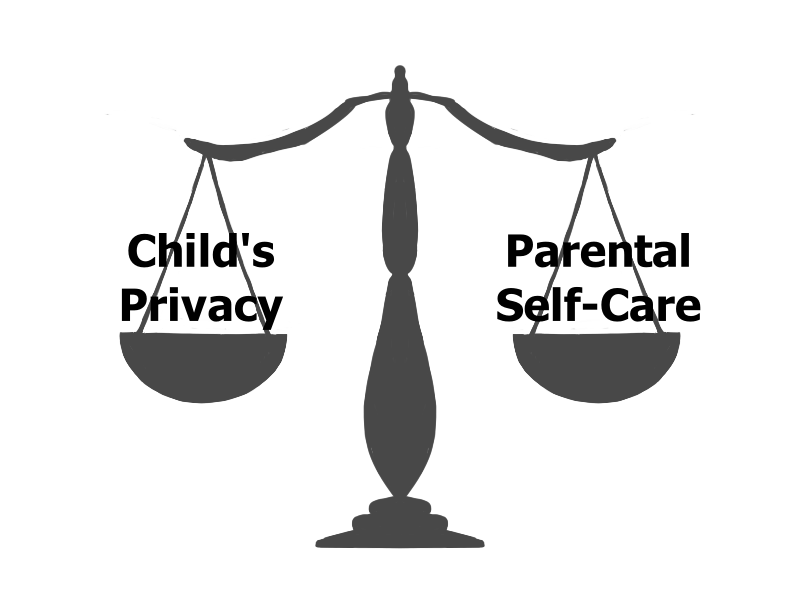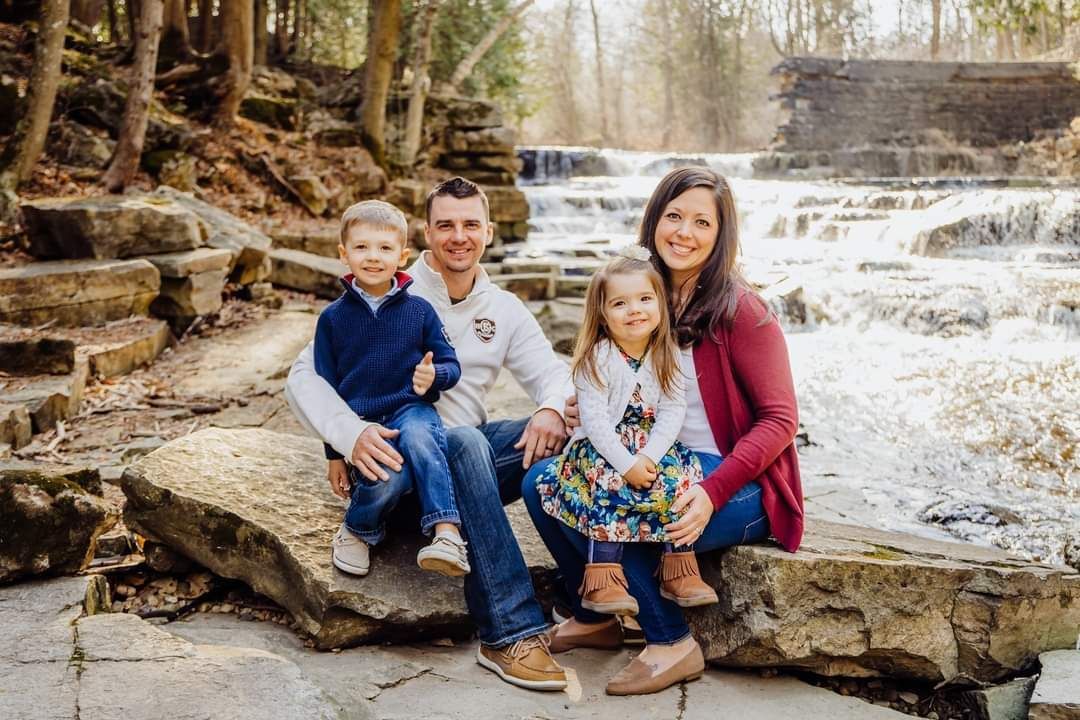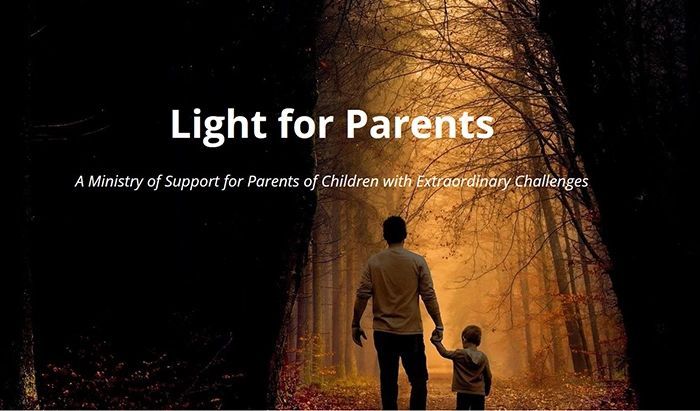A Child's Privacy vs. Parental Self-Care: Finding Balance
October 11, 2022
A Child's Privacy vs. Parental Self-Care: Finding Balance

Parents raising children with extraordinary needs must make the same judgment call week after week, month after month, and year after year: Whom can I talk to about what’s happening with my child? Concerned parents know that their children need some level of privacy. We probably don’t want to share information like this with just anyone:
- A child’s struggle with embarrassing problems, such as bed-wetting into the teen years, excessive fears, and over-sensitivities
- An adopted child’s birth family history, including any trauma the child experienced before placement
- A child’s behavioral issues and major meltdowns that happen on a regular basis
- A child’s struggles with an addiction
- The child’s diagnoses that have negative connotations and might even make other parents reluctant to allow playdates
- Other mental health issues, such as the child doing self-harm or having a history of attempting suicide
We can all understand why it is important to keep these things private (outside of letting medical professionals, therapists, and teachers know what is necessary to work with your child). We want to protect our children from embarrassment and from being pre-judged by those who don’t know them. We want our children to have the right as they get older to decide how much of their personal information they wish to share. We want to recognize that once information is widely shared, future employers will probably know about it.
But when parents dealing with these challenging issues with their children every day, it can also be detrimental to those parents to keep what they are experiencing to themselves. Probably the biggest challenge faced by parents of children with extraordinary needs is isolation. Parents feel alone and overwhelmed in their struggles, but they want to respect their children’s privacy, so they don’t tell others what they are going through—after all, parents need to be self-sacrificing and put their children first, right? The obvious results for the parents can include exhaustion, stress, depression, anxiety, and mental and physical health problems of their own.
So, how do we parents of children with extraordinary needs balance each child’s need for privacy with our need for encouragement and support from others? It’s never easy, but here are a few thoughts that might help.
You can’t care for a child with extraordinary needs well if you don’t take care of yourself.
If you are exhausted, how can you cheerfully and lovingly care for a child with great needs? The same is true if you are under great stress, depressed, anxious, or suffering health problems. Having a network of people to support and encourage you can make all the difference. Sometimes talking with a friend can keep you from becoming discouraged and even help re-energize you! This will benefit not only you, but also your child.
Put together a circle of confidants, but keep the circle small.
It is important to respect your child’s privacy, but you also shouldn’t feel totally isolated with the challenges you’re experiencing. Carefully choose a few people whom you know you can trust, and talk with them. They can be close friends, extended family members, spiritual leaders—you know best who would be a willing listener and yet keep the information you share private. Reaching out to safe, trustworthy people will not destroy your child’s reputation and future.
Never put negative information about your child in social media posts.
It can be tempting to post the problems you are experiencing on Facebook or Twitter—you’ll probably get lots of supportive comments! But that information will then be on the Internet forever. If you do want to use social media to get constructive ideas from parents facing similar challenges, make sure you go to a private forum. Even there, avoid using your or your child’s real name or other identifying information. You should be able to get valuable tips without violating your child’s privacy.
Look to your church family for confidential support.
Each congregation is different, but consider the options in yours. Is there a pastor or staff minister to whom you can talk? Another parent of a child with special needs—possibly someone who is experienced but now an empty-nester? A special education teacher? A small group Bible study where information must be kept confidential? Jesus wants his people to show Christian love to one another. Someone in your congregation may be praying for the opportunity to support parents in this way!
Find a support group for parents facing challenges similar to yours.
Support groups usually have a “rule number one” that everything said in the group stays in the group. Try to find one that meets your whatever matches your situation. Many groups exist for parents who have adopted, parents of children with mental health needs, parents of children with specific diagnoses such as ADHD, autism, cerebral palsy, and more. In our connected world, we are no longer limited to what is available near our homes—virtual groups are available to meet online. This should definitely help reduce the isolation so many parents have had to experience in the past!
Remember that you are never alone.
God is with you. He knows the challenges you are facing, so you won’t be violating anyone’s privacy. And even though he knows everything that is happening, he loves you and your child more than you can possibly imagine. Talk to him everywhere you go. Pray continually (1 Thessalonians 5:17). Nothing will be more helpful to you—and your child!
by Jane Mose
(Adapted from a post on JaneMose.com)

When I became a mother years ago, our first family Christmas together as three arrived with hope and expectation for what the holiday would look, smell, and sound like for years to come. Our perfect tree would glisten with hundreds of lights and handmade ornaments from my son. When he got older, we’d bake and decorate gingerbread cookies, filling the air with the sweet aroma of the season. One day, I’d hear him recite the beautifully familiar words of Luke 2 with his classmates at our church’s children’s service. Seven years and a few diagnoses later, my great Christmas expectations are quite a bit different than a younger me had dreamed. Our beautiful gift from God does not have the attention or interest needed to create the sweet Christmas ornaments that his siblings eagerly make and hang on our tree. In fact, the tree has become quite top-heavy as we daily move more ornaments toward the sparkling angel above so that my son does not try to use them as sensory chewies. His fine motor skills make cookie-decorating challenging and frustrating (though eating them is still a joy!). My son’s voice does not function as a typical child’s does, so we may never hear him announce the arrival of baby Jesus with his classmates and the angels in Bethlehem. The reality of my son’s condition has required us to adjust our great expectations. For families with similar journeys, these reminders of our world’s brokenness can shatter our hearts at times. Although the sweet baby born to me seven years ago is not quite the same as we anticipated, our long-expected Jesus has still saved each of us by his humble birth, perfect life, redeeming sacrifice, and glorious resurrection. God made flesh, born in Bethlehem long ago means that Christmas is about so much more than the beautiful traditions we’ve come to enjoy and expect. It means that one day my son will use his own voice to sing “Gloria” for eternity with me and the entire host in heaven. I cling to that Christmas joy with eager hope and great expectation. “Glory to God in the highest!” Luke 2:14 By Becky Grefe Note: If your Christmas expectations have had to change because your child becomes very dysregulated around the holidays or even sabotages Christmas, you may find understanding and ideas here: https://christianfamilysolutions.org/2023/12/12/children-and-challenging-behavior-when-your-child-sabotages-christmas/

In my last blog post, I began sharing what I learned from an interview I had with my friend, Kiara, who is the mother of a daughter with mild cerebral palsy (CP). I too have a daughter with a physical disability. She was born with a rare heart condition known as Ventricular Inversion with and L-transposition of the Great Artery of the heart also known as LTGA. Years later this experience has led me to be part of the WELS ministry called Light for Parents, which supports parents of children with extraordinary physical, mental, or emotional challenges. I believe that learning from parents like Kiara enables us to better support and walk alongside them. Kiara’s daughter, Coralea, struggles to use her trunk and legs due to her CP, but she is not disabled cognitively. I asked Kiara how a typical week for her is different from the experiences most moms seem to have. Kiara explained that since the CP affects mainly Coralea’s trunk and lower body, her mom must carry her everywhere and help with toileting and dressing. During the day, Coralea wears orthotics (lightweight plastic that is molded to fit her calves and feet, with hinges for limited movement). Coralea requires help with stretching and exercise twice each day. At night she wears resting splints to maintain her leg and foot positions, which impacts her sleep as well as that of her parents. Five days a week, Coralea attends a preschool where her mother is a teacher. This allows Kiara to monitor and provide additional help to her daughter as needed. It also offers Coralea a chance to grow academically and socially. Her parents take Coralea to physical therapy appointments twice each week. (The therapist wanted them to happen three times per week, but that was too much for the family.) As Coralea grows, she undergoes “serial casting.” This involves the application of below-the-knee walking casts to address contractures, or muscle tightening and shortening, by stretching and lengthening the muscles. In addition, she receives Botox shots every 3-4 months to help relax her muscles. These requirements add more medical visits beyond the therapy two times per week. In addition, all of these treatments require constant monitoring and communication with the insurance company. Most of us would find this a challenging schedule, to say the least, but my friend is able to juggle all of that and still find a way to be positive and encouraging to others around her at the preschool and at church. I believe that her ability to deal with all of this comes from the Lord. God has provided her with a supportive family and friend group. She is also led to participate in Sunday services and weekly Bible growth groups to continue to learn and be encouraged from the Word. When your child has challenges, is it always easy to be positive and not want a “normal” or “typical” day as a mother? No, it’s not. But over time the Lord teaches us that our schedules, though busy and chaotic, are the “new normal” he has placed in our path of service to him. Relying on him is what makes it possible, so that we can be up for whatever comes from day to day. As fellow Christians, we need to support these parents or children with extraordinary challenges. We can support them with prayer, verbal encouragement, a text or phone call, a gift card for dinner, or even an offer to help with caregiving from time to time. Whatever form it takes, supporting one another is part of us joining Jesus on his mission of grace. Please take a moment to pray that you can be an instrument of support to the parents God has placed in your sphere, modeling his love for them: Dear Lord, I don’t always understand what it is like for parents of children with challenges. Help me be open to helping them in any way possible. This may require me to step out of my comfort zone, but please give me the courage to do this, showering them with your love. Amen. by Pam Schleg

I am the mother of a daughter born with a rare heart condition known as Ventricular Inversion with an L-transposition of the Great Artery of the heart, also known as LTGA. My daughter is now grown up and working as an occupational therapist. Recently, while watching home movies of her and my other daughter, I was reminded of the first time we received her diagnosis. She was about six months old. This also made me ponder a question. How do other parents of children with physical, mental, or emotional challenges deal with their children’s diagnoses? How could we better support their parents? I recently talked with a fellow mother at our church whose daughter is diagnosed with a mild case of Cerebral Palsy (CP). She struggles to use her trunk and legs but is able to keep up cognitively. Her mother shared with me some of the same thoughts and feelings that I believe most parents of children with challenges experience. Let me give you a little background on my friend Kiara and her daughter, Coralea, whom her mother describes as “sweet but sassy.” Kiara had an emergency C-section when she gave birth to her oldest son, Camden. That caused her to have scar tissue, which affected her ability to carry her daughter to term. Her daughter, Coralea, was born at 30 weeks with Kiara experiencing severe bleeding and being close to death. But the Lord had a plan for this special mother, child, and family. Coralea was in the NICU for 56 days. Kiara and her husband, Andy, had to drive 45 minutes to the hospital and back with a two-year-old, which added to the stress of the situation. Kiara reported that the hospital didn’t communicate well with her, especially on one occasion when she found an empty bed and was forced to ask where they had moved her daughter. Come to find out, they were keeping her in an area where they could better observe her heart related issues. Even at that point, Kiara reports, none of the medical professionals had mentioned anything about CP. “I never saw any symptoms of CP. The medical team did three scans and didn’t say anything to me. At nine months old, I noticed that she wasn’t sitting right. I knew that something wasn’t right and I took her to physical therapy. They told me that she had CP and no one had really told me. It was an awful day.” Everyone has a different story as to how they were told their child has a disability. Maybe you, like this mother or others, had a feeling that something wasn’t right and you went and got things checked out. No matter how your journey started, it is a difficult one. In the coming weeks, I would like to share with you some ways that other parents and I have been able to walk this road the Lord has placed us on. We can be successful at staying close to the Lord even while getting through daily life, navigating appointments and relationships with family and friends. You are not alone. I have a plaque in my house which reads, “Be still and know that I am God.” No matter how many times we have moved over the years, this plaque and message has continued to be in a prominent place in our house as a reminder to me and my husband. Yes, God is in control, even when life is swirling around us. by Pam Schleg

Originally posted in His Hands from the WELS.net . Do you know most of the members of your congregation—or, at least, do you recognize most of the people who regularly worship at the same time that you do? If you belong to a smaller-sized church and worship regularly, you may be able to answer “yes” to both questions. In a very large congregation, you might not know all of the church’s members, but you may trust that the members of your church staff do. However, it is very possible—even likely—that your congregation has members who are unknown to most others and possibly pretty unfamiliar to the staff. No, I’m not referring to members who are considered “straying sheep”—who are choosing not to attend worship or be involved in church activities. Nor am I referring to elderly members who once attended regularly but are no longer able to do so. Instead, I’m referring to other Christians who may be hidden from the congregation: parents of children with extraordinary challenges. Through our work in the Light for Parents ministry, we often hear from parents who very much want to join in worship regularly and feel connected to other Christians, but have found this to be nearly impossible because of their child’s disability, medical condition, or mental health or behavioral challenges. Consider these examples: Jim and Kathy realize that their child with sensory processing disorder cannot be in the sanctuary for a worship service because the sounds are so loud or the lights so bright that the setting becomes overwhelming. Adoptive parents Tom and Grace know that their child, who has a history of being abused, is likely to be frightened by the crowd or by certain people in the sanctuary who appear scary, resulting in “fight or flight” behaviors. Matt and Laura are concerned that their child who has a disability will loudly make involuntary grunting noises or call out words at random times, disrupting the service. Sarah and Kevin, parents of a child with ADHD, know from experience that their child will not be able to stay in the pew for the duration of the service, but will need to walk around or even run during that time. Kelly and Jacob are worried that their child, who has frequent meltdowns due to autism spectrum disorder, may have a meltdown at church. Bill and Hannah, parents of a child with a medical condition that severely weakens their child’s immune system, are concerned about exposing their child to so many people in a relatively small space. Greta and Phil, whose child is difficult to move from one place to another due to a physical disability, are exhausted from caring for their child’s needs each day and unable to imagine adding another difficult trip: the journey from home to church and back. *All names have been changed. These are just a few examples of parents who struggle to find opportunities to worship in church or get to know other congregation members. They stay in the background, often becoming very isolated from their fellow Christians. They are hidden within congregations. These parents would love to be present at worship services. They would love to have the friendship and support of other Christians. They would love to serve others outside their homes. And they would love to have their children participate in the various children’s ministries that their church homes offer. Yet they remain hidden. God tells us “Carry each other’s’ burdens, and in this way you will fulfill the law of Christ” (Galatians 6:2, NIV). Now that you now about these “hidden Christians,” would you like to know how you can help carry their burdens and make it possible for them to play a greater role within the congregation? The first step is awareness—learning which parents in your congregation are isolated because of their children’s challenges and asking them their needs. Try saying, “I would truly appreciate the opportunity to be a blessing to you. How can I be helpful?” The next step is making your worship services and children’s ministries accessible to all. This involves more than just having special parking spaces and ramps available. It involves letting isolated families in the congregation know that you truly want to make it possible for them to worship, and then building a circle of support around them and meeting their family’s worship and children’s ministry needs. As you do so, you may find that your congregation will begin to get a reputation as one that is very welcoming to all, and your ministry may grow as a result! How to carry this out is a big topic, but Light for Parents is here to help. We have speakers available who would be happy to come share with your pastors, staff ministers, teachers, children’s ministry staff, and all members ways that your congregation can better open its arms to families of children with extraordinary challenges. A partial list of available topics can be found at www.lightforparents.com/speaking . Let us help you learn how you can be a blessing to your “hidden Christians”—and how they can be a blessing to you as well! Written by Jane Mose Light for Parents Program Coordinator

The life of a special needs family so often revolves around seemingly never-ending appointments. Weekly visits with therapists become the norm. Every visit with a primary care provider seems to result in an additional scheduled appointment with a new specialist. On top of that are the care-coordinating appointments that require you to somehow recall the names and phone numbers of every therapist, doctor, teacher, and specialist that your child sees. (Am I the only one that hasn’t created a document for this yet?) While these appointments are important for the well-being and life-skill advancement of our loved ones with special needs, they can also feel daunting. Even if appointments are not anxiety-inducing for you or your child, it can be just plain tricky to keep everything straight, especially when you consider the other events and obligations of your family. If you are able, take a step back and a deep breath in the midst of the meeting madness to consider how many people you come into contact with at each appointment. You likely see at least one therapist and receptionist at weekly OT, PT, and/or speech appointments. Do multiple ABA therapists come into your living space on a daily basis? When you visit the doctor, you are often first seen by a nurse and medical assistant. And, while you wait, you might encounter families who may also be supporting a child with extraordinary challenges. The number of people, of souls, that you meet throughout your child’s many appointments is likely larger than you think. This means that there is also a great deal of kingdom work that can be done in these settings! Let us be advocates for our children AND for Christ as we let our lights shine in the places God puts us on a regular basis. Here are some tips for doing this: 1. Wear your faith. Do you have a cross necklace or t-shirt from a church event? Wearing these items to therapy appointments is a great way to share Jesus. Even if they don’t spark any conversations, others will likely notice that you are wearing something that points to Christ. If you choose to do this, remember to support your wardrobe with a positive and encouraging attitude! 2. Be available. Some days it seems like the waiting room is made for an hour of respite, while other days can be viewed as a chance to encourage others and possibly even share your faith. Be open to chatting with other parents or the receptionist in the waiting room, even if it means giving up a bit of “me-time” occasionally. By talking with others who may be in a challenging situation, they notice how you have time and concern for them. Jesus calls us to serve others, and by following through in this way, we reflect Christ’s love. 3. As for me and my household, we will serve the LORD (Joshua 24:15). Do medical or behavioral specialists come into your home to support your loved one? Do they see Scripture on the walls and faith-centered books and movies on your shelves? Our homes can be a great way to witness to the way we live our lives in thanksgiving to Christ for all he has done for our families. Our Father has given us the gift of great (and big!) teams to provide for our loved ones with extraordinary challenges. God has put each of these people into our lives to support the well-being of our children. Let us not forget that God may be putting us into their lives for an even bigger and eternal purpose! May God bless you as your let your light shine for him! by Becky Grefe

I see you, family in the back pew. I’m there with you. My family usually arrives to church after the first song finishes because we had to change that last-minute pull-up. My husband didn’t get to hear the sermon because he was busy whispering the Daniel Tiger theme song in my son’s ear to avoid the raspberry-blowing he would otherwise engage in. We dart out quickly after the service because one hour is about 20 minutes past the max attention span of our special needs family. Does it seem to you that there are few, if any, families that look like yours? Does it feel like your son or daughter is the only person in your congregation with extraordinary social, physical, developmental, or emotional challenges? The truth is that there are likely many individuals with unique needs and skills within your midst; however, for individuals with disabilities and their families, it can be intimidating and downright challenging to get involved in their congregations. Perhaps supporting a child with autism or sensory processing challenges makes social events like church picnics or potlucks extremely nerve-wracking for your whole family. Maybe physical limitations mean that typical and visible roles such as ushering are not an option. A family may feel self-conscious about atypical behaviors that their child may display. (Cue the raspberry-blowing during the silent prayer!) God has called each of us to serve in his kingdom. He created each of us with different strengths and abilities to do his work. This includes people with special needs and their families! Sometimes time commitments or personal energy reserves might be prohibitive in serving as part of a congregation’s ministry in major ways, or for a period of time. Yet with some creative thinking, families of individuals with special needs and their congregations can find some great ways to open avenues to service for all members. Here are just a few ideas to spark your imagination: 1) Be a greeter! Does your loved one use alternative communication such as an AAC device? Greeting might not be at the top of your list, but hear me out: Consider how supporting your loved one in greeting with alternative communication can not only help them get involved, but also educate other members about alternative and augmentative communication! 2) Get behind the scenes. If being involved in social events is a challenge for your loved one, consider some “behind the scenes” tasks to help the church. Can you prepare materials for worship, fellowship, or Sunday school? Would counting offerings be an option for your family? Check with your pastor or secretary to see what jobs you could complete at home. 3) Start small. Maybe you are a parent to several young kids, including one with a significant disability. You may feel like you can’t effectively volunteer because you need to keep your eyes on your children at all times. This may be true, but churches often have a wide variety of tasks that need to be completed, and every little bit can help. Don’t discount your ability to help and serve because you can’t do something big. Find something small and dive in! 4) Support a special needs ministry. If you are reading this, you likely have a heart for people with special needs. Do you have the time and passion to start a dedicated special needs ministry at our church? Would you enjoy providing spiritual, emotional, and physical support to people with disabilities and their families within your congregation? This is a vital ministry opportunity, and Light for Parents can help you get started*. God has carefully and purposefully created each of us. Through the Spirit, we are all equipped to do his work. Serving in the church may look different for special needs families, but that service also contributes to God’s kingdom. Don’t take my word for it; our heavenly Father’s calling is crystal clear: For we are God’s handiwork, created in Christ Jesus to do good works, which God prepared in advance for us to do. (Ephesians 2:10, NIV) May God bless you and your congregation as you discover how your family can best serve! by Becky Grefe *If you are interested in starting a special needs support team in your congregation, please send an email to lightforparents@gmail.com . We have a great deal of resources and would love to help you get started!

In many ways, parents whose children have entered the family through adoption are just like other parents. They love their children and want to do their best to take care of their children’s physical, spiritual, emotional, academic, and social needs. But parents who have adopted also face some unique challenges that they wish their loved ones understood. Perhaps I’m being presumptive in writing this, as I can’t speak for all parents who have adopted. But as a parent who has adopted and who has many friends who have done the same, I think I can say that most of us wish you would understand the five statements that follow. 1. We adoptive parents don’t identify our children by how they came into the family. We don’t say that our children are adopted, but rather, were adopted. We don’t have adopted children and birth children. Whether our children entered our families through adoption or through birth, they are simply our children. Some parents will even quip, “We have some children through adoption and some through birth. We can’t remember which are which.” While that’s a bit of an exaggeration, we don’t want any of our children to be referred to as “the adopted children.” And we definitely don’t want people to ask, “Did you adopt them, or are they your own?” All of our children are our own. 2. We don’t love children we have adopted any less than children who are born to us. After we began the process of our first adoption, we found out that I was pregnant. I’ll never forget the phone call I made to the adoption worker at our agency. When I told her I was pregnant, she said the adoption was off. When I asked why, she said, “Because you won’t love an adopted child as much as a birth child.” My first thought upon hearing this was that this person had no business working in an adoption agency. If you believe that parents can’t love children who were adopted as much as they love children born to them, why would you place a child into that home through adoption? No matter how a child enters a family, good parents love that child more than words can express. 3. Our children probably have extraordinary needs. All children who have been adopted have been through trauma. They have lost their birthparents. Even if a child was well cared-for in a foster home and came into the adoptive home at a very young age, that trauma is still there. This is not to say that every birthmother should choose to parent her child in order to avoid this trauma; other factors must be weighed as well. It does mean that the child who was adopted is likely to have the types of academic, behavioral, and emotional special needs that are common among children who have experienced trauma. Many children who have been adopted also faced other types of trauma, such as abuse or neglect, before being placed with their forever families. In addition, children often come with unknown health problems, especially if they were adopted internationally. It is important to adoptive parents that their extended families and friends are understanding and patient with them, as raising their children may take an extraordinary amount of the parents’ time and energy. 4. We adoptive parents are afraid that you might make negative judgments about us, especially if we ask for help. As stated in the third point, because of their backgrounds, children who were adopted may have extra academic, behavioral, and emotional challenges. But people easily judge the parents of those children. Comments such as these are fairly common: “If I were raising that child, I’d discipline him, and he wouldn’t act like that.” “If only the parents would work more with this child, she wouldn’t have these problems with schoolwork.” “I don’t know why these children act like this. They were adopted so young that they can’t even remember what happened before then.” Parents of children who were adopted may be hesitant to let you know about their challenges because they fear you’ll judge them as bad parents. They also may be afraid to ask for help for fear that you’ll say, “You chose to bring this child into the family. Since it was your decision, you need to deal with the results.” You’ll need to let adoptive parents know that you may not understand their challenges (especially if you have never adopted), but you know those challenges are real and want to support the parents. 5. We adoptive parents aren’t saints or heroes. We don’t want our children to be told, “You ought to be grateful that your parents were willing to take you in!” That is a way to lay a permanent guilt trip on our children for being adopted, even though they probably had nothing to do with the decision! Also, while adoption is a starting point for life with a new family, it is also an ending for the child's life in their first family. This makes adoption both a happy and a sad occasion for the child. And although the child who finds a loving family and a forever home is blessed through adoption, so are the parents and siblings of that child. While Christian parents may adopt out of love for God, because he tells us to care for orphans (see James 1:27), those parents also eagerly look forward to having a child–or, another child–to love. Those of us who have adopted children don’t seek your admiration. But we truly could use your love and support. by Jane Mose (Adapted from a post on JaneMose.com)

Hyper-vigilance. It’s a term often associated with post-traumatic stress disorder (PTSD). It refers to living in a constant state of anxiety and awareness–always being “on guard.” We understand why soldiers returning from war zones struggle with hyper-vigilance. But most people don’t realize that a large percentage of parents raising children who have extraordinary special needs also live in a constant state of hyper-vigilance. Here are just a few examples of what parenting with hyper-vigilance is like: The phone rings during the school day, and a mom’s heart skips a beat with the fear that the school is calling to say her child has had another seizure. A dad takes his son to a playground but stays within arm’s reach of him the whole time, concerned that his boy might run away or start a fight with another child. A parent who just left home remembers, “I forgot to lock up the cabinet with the knives!” and calls home in a panic, realizing that the depressed teenage daughter at home may find them and use them to cut herself. A parent of a child with fragile health constantly washes and disinfects surfaces, watches to make sure no one who has a cold gets close to the child, keeps the child close whenever at the doctor’s office in order to avoid touching germy surfaces, and becomes frightened at the first sign of any possible sickness in the family. As a mom shops with her son, she keeps surveying the store, thinking, “The announcements over the P.A. are too loud. The lights are too bright. There’s too much stimulation in this aisle. I can’t find a checkout lane without candy displayed. What if he has a meltdown before I can check out with this full cart?” Parents avoid going to church as a family because they are afraid that their child will have an outburst during the service or run around the sanctuary. Many more examples are possible, but you get the idea. Parents who have children with extraordinary needs often develop this hyper-vigilance naturally as they learn to take care of their children. But hyper-vigilance takes an enormous toll on parents emotionally, physically, mentally, and even spiritually. If you recognize signs of hyper-vigilance in your parenting, here are some things you can do to reduce the negative impact on you: Don’t compare yourself to parents of children without extraordinary needs. Your parenting may seem over-anxious and overprotective when you compare it to the parenting style of your friends, but their children don’t have the same needs as yours. (If they did, those parents would probably be hyper-vigilant too!) You have learned to be hyper-vigilant because you love your children and want the best for them. It’s not something you can completely remove from your life. But acknowledging that you are living in a state of hyper-vigilance is the first step toward taking care of yourself and using coping strategies. Give yourself a break. I know—we’ve all been told that we need to take some time away from our children and relax as a couple or with friends, but that’s not easy to do when raising children with extraordinary needs. Taking a break may not be as easy as hiring a teen-aged baby-sitter and going out for a night, as no teenager may be able to handle your child’s unique needs. But you do need breaks. If you have family members or friends nearby, tell them what you are going through. Ask if they would be willing to learn about your child’s needs so that they could give you an occasional night away. If you have no one close by who can do that, at least tag-team as parents, giving one parent, then the other, the opportunity to have a fun night out with friends. Join a support group. Raising children with extraordinary needs is very isolating, and it can seem as if no one can truly understand what you are going through. But your community may have support groups available for parents of children with all sorts of needs: children with cerebral palsy, children with mental illnesses, children who were adopted, children with attention deficit-hyperactivity disorder, children with autism, and much more. Your child’s doctor may be able to help you find what you need, although often a quick Internet search will work just as well. Going to a support group—or joining an online one—can help you by reducing your feelings of isolation, giving you a chance to share your story in a safe place, helping you learn coping tips from other parents in similar situations, and more. Again, it can be hard to get away if the group is in- person, but talk to the group leader. It is likely that other parents have had the same obstacle, and the group might have worked out a way to make it easier to attend. Make your physical and mental health needs a priority. We parents of children with extraordinary needs tend to prioritize our children’s needs above our own–I get it! But no one can do that indefinitely without it resulting in serious health problems. Here are some ways to prioritize your needs: Realize that there is nothing wrong with saying “no” to the types of volunteer commitments that most parents are expected to make. You need a lot more time and energy than the average parent just to keep your child safe and healthy. Give yourself permission to go to bed on time every night, even if the house isn’t clean and the paperwork isn’t done. When you grocery shop, get healthy foods that are easy to grab quickly so that even when you’re rushed, you can eat healthy items (think meat and fruits) rather than grabbing a bag of chips. Consider using online grocery shopping so that you can order good foods ahead, pick them up at a designated time, and avoid all the challenges of shopping with children. Get some exercise each day, even if it’s walking around your yard or house or working out with an exercise video. Most importantly, take care of your mental health by spending time each day in God’s Word, by doing deep-breathing when things get stressful, and by seeing a counselor when the stress is getting overwhelming. Keep in mind God’s love and his promises to you. Thinking about God’s love and his promises have been huge for me—I often wonder how I ever could have gotten through our most challenging situations as parents without my faith. At various times, the future for one child or another has seemed bleak. Whenever that happens, I remind myself that God loves my children even more than I do, and that he has promised to make all things work for the good of those who love him. (See Romans 8:28.) He also has a plan for each of us, including children with extraordinary needs. (See Jeremiah 29:11.) And when I don’t know what to do as a parent—which is often—I can trust in him for wisdom. (See Proverbs 3:5,6; James 1:5.) God loves me, the frazzled, hyper-vigilant parent, and he loves you too. Go to his Word and pray to him, and you will find rest (Matthew 11:28). by Jane Mose (Adapted from a post on JaneMose.com)

The new school year has already begun in many parts of the United States, and in other areas it will begin soon. In my time as a special educator and as a parent of children with extraordinary needs, I’ve gotten a lot of feedback from other parents about what they truly wish their children’s teachers would understand. If you are a parent of a child with extraordinary needs, perhaps you could share this list with your child’s teacher(s), highlighting the ones that are most important to you. Dear Teacher, I want you to know that… 1. I have dreams and goals for my child that you should know about. Like any parent, I have hopes for the future for my child. If you would ask me about my dreams and goals for my child and then help us work toward them, I would be SO appreciative! 2. I might have difficulty being open with you about all of my child’s challenges. I might be afraid that telling you about those challenges would predispose you to have a negative attitude toward my child and not want them in the classroom. I might also have tried to open up to teachers previously and had a bad experience as a result. You will need to gain my trust so that I can be open with you. 3. I might not be able to be as helpful to you as you would like. Raising a child with extraordinary needs can be exhausting. You might not fully understand the time spent going to appointments, carrying out various therapies at home, and even trying to teach basic skills of daily living to my child. In addition, after working hard to stay regulated all day in the structure of school, my child might be letting loose with energy and explosive behaviors after school and in the evenings. All of this takes a physical and emotional toll on me as a parent. As a result, I might need breaks during the school day rather than volunteering at school or going on field trips. And I will probably not be able to enforce school discipline at home or consistently help get homework done, which brings me to my next point. 4. My child may need reduced assignments and less homework. If my child is on ADHD medications that wear off at the end of the school day, completing homework in the evening is often nearly impossible. If my child has learning challenges, they need a break to relax after struggling to complete work all day in school. Homework might take my child much, much longer than it takes for their classmates, and having conflicts and crying over schoolwork each night is not good for my child (academically or emotionally) or our family. Please reduce the amount of homework as necessary to meet my child’s unique needs. 5. I need to hear encouraging words more than guidance from you. If you haven’t parented a child with the same unique needs as my child, you really don’t understand what it’s like—and even if you have, my child is still different from yours. I know you’re trying to be helpful when you tell me what I “should” or “need to” do, but this can come across as pressure from someone who doesn’t fully “get it,” and it can make me trust you less. But I would really appreciate words of encouragement from you about the good things you see in my child and the loving job I am doing as a parent! 6. I am the expert on my child. Other than God, no one knows my child better than I do. I’ve spent time with my child and gone to many appointments with specialists treating my child, listening to what they have to say. I’ve also done my own reading and research and might have sought out other parents in similar situations for support and input. I would appreciate your showing that you value my expertise by asking my advice when you have questions about my child. You could ask me questions like, “What works best for you when…?” and “Do you have any tips for me about…?” 7. When my child is having a meltdown or explosive anger, they are not giving you a hard time; they are having a hard time. Children with disabilities like autism and sensory processing disorder, as well as children whose brains have been rewired by early trauma, often respond to situations with greater anxiety and fear than expected. This is often expressed as anger or meltdowns and needs to be responded to with calm reassurance. Your ability to stay calm will help my child feel safer. 8. It is scary for me to leave my child in your care. I know my child’s challenges, and it is difficult for me to leave my child with a new person to handle those challenges. When I leave my child with you, I am trusting you to be patient and caring with my child. 9. I need to have more positive contacts from you than negative ones. If you only contact me to tell me about problems my child has, I will eventually feel that you are looking at my child as a problem, not a child. Please let me know the good things you are seeing. Call me or send me a note when you see academic and behavioral improvements, no matter how small. Share with me the positive things you see in my child! 10. I want your awareness, but not your pity. My child is a blessing, both to me and to you, and is a precious child of God. Sometimes I feel guilty asking you to put in the extra time and effort necessary to meet my child’s needs, but like any parent, I want what’s best for my child, and this year, I feel that what’s best will be working with you! Please look on my child as a blessing from God, rather than a label. More than anything, I want you to be thankful to have my child in your room, just as I am thankful to have my child in my life. And remember—I am thankful for you as well! by Jane Mose

Families with children that have extraordinary needs long for a place of comfort, rest, and community. Yet often, they shy away from attending worship, where these things can be found in abundance. Reasons for this vary and are different for every family’s needs and situation. However, there are ways that our congregations can support these children and in turn, welcome families back into worship with open arms. Visual and auditory sensitivities in your place of worship Some children with extraordinary needs experience sensitivity to loud sounds and bright lights. Now, imagine your sanctuary with the eyes and ears of someone who would experience it in these ways. What do you observe? Perhaps your sanctuary has a tile floor and tall ceiling that causes an echo. Maybe you have bright, canister lights on the cross toward the front of church. Maybe you have a beautiful, loud organ that plays wonderful music every week. These features aren’t a bad thing. In fact, they’re blessings! But they might cause a child with visual or auditory sensitivities a high amount of discomfort. To make it more possible for children (and adults!) with sensory issues to attend worship, consider implementing a “sensory friendly” service on a regular basis, using the tips that follow. The service could be held in your regular worship space or in an area designed specifically to meet sensory needs. Here are just a few ideas for you to take into your worship space: 1. Add rugs or carpeting to the floor of your sanctuary. This will absorb sound and lessen any echo. If the congregation prefers the acoustics of tile or hardwood floors in the sanctuary, you could either have a “sensory friendly” service in a large, carpeted room in your building, or stay in your sanctuary but lay out rugs in the sanctuary only during that special service. 2. Place child-sized and regular-sized noise-canceling headphones on a rack near the worship area. Include a small sign that explains what they are and that they are disinfected after every service. 3. Purchase light bulbs with a lower wattage for accent lights. Walk around the sanctuary, and ensure that the bulbs are not visible from any seats. If you have fluorescent lights, you could purchase cloths specially made to cover those, often using magnets. (A quick search on Amazon will bring up examples.) 4. Consider bringing a piano into your worship on certain Sundays or during a certain service instead of using the louder organ. 5. Make sure that your church’s audio system is of high quality. Crackling and distorted sounds can be overwhelming. Keep the volume at the minimum level needed to ensure that the message and music can be heard. Is there anything your church shouldn’t do? Cry rooms are a wonderful resource, but never make a family feel as if that space is their only place to go in church, making them feel unwelcome in the sanctuary. Also, don’t ignore feedback about sensory sensitivities in your place of worship; instead, listen to concerns and work together to find solutions. Of course, more ideas are available to make worship comfortable for everyone. Please share with us your ideas and stories about how your congregation has made worship more sensory friendly by sending a message to staff@lightforparents.com or commenting on Facebook! by Erin Stob